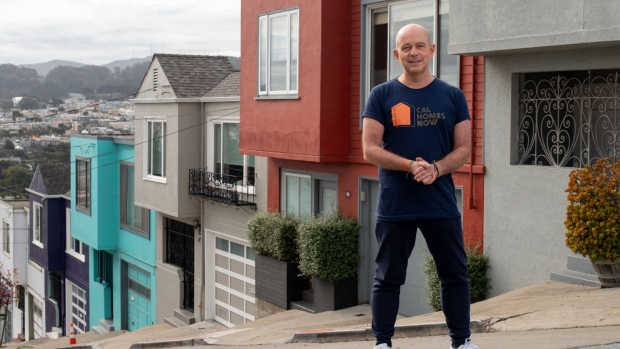Apr 11, 2024
Most Expensive Housing Markets in the US Get Unexpected Rebel
, Bloomberg News

(Bloomberg) -- At first glance Steve Hilton is an unlikely champion of America’s middle-class homeowner.
The former Fox News host and adviser to ex-British Prime Minister David Cameron lives in Atherton, California, the most expensive ZIP code in the US. He’s married to Rachel Whetstone, a Silicon Valley powerhouse who joined a local campaign against multifamily housing in their own exclusive town.
Yet on a rainy night earlier this year in San Francisco, Hilton was hosting an event at Shack15, the swanky private club on the top floor of the Ferry Building, to talk affordable housing. His primary focus: how to tame the costs that have turned large swaths of California into the most expensive markets in the country and made home ownership akin to a luxury good.
He’s far from alone. California’s high prices are spurring an array of proposals aimed at boosting the housing supply. Some state lawmakers want to lower the voter threshold needed to approve bonds and special taxes for affordable housing. More dramatically, a group of Silicon Valley billionaires is backing a project dubbed California Forever to build a whole new city northeast of San Francisco.
Hilton has his own plan: He proposes loosening environmental rules and capping the fees developers pay to towns and cities as a way to bring housing within reach for more people.
“I remember that incredible feeling of walking across into the apartment I bought in London the first time – that I owned it with my money,” he told the assembled tech workers and professionals at Shack15. “That feeling is just being robbed of this generation.”
The numbers bear him out. California has the highest median home value in the country at almost twice the national average, according to Redfin. The median home in the Los Angeles area now costs $884,400 and in the San Francisco Bay Area it’s $1.25 million, data from the National Association of Realtors shows.
Then there’s Atherton, home to such luminaries as Golden State Warriors star Stephen Curry and Silicon Valley heavyweights. The median home there is valued at more than $7 million, based on a Zillow index.
The soaring prices have long undermined California’s historic image as a land of opportunity for people from all walks of life. The share of California adults who owned their own home was less than 44% in 2021, the UC Berkeley Terner Center for Housing Innovation said in a report.
That was about 15 percentage points lower than in the rest of the US, the largest gap on record.
Ballot Measure
Hilton, who became a US citizen in 2021, initially tried out a decidedly Californian solution — to collect enough signatures to get an initiative on a ballot to change the state’s restrictive building laws. Called the California Homeownership Affordability Act, his proposal sought to tackle the “impact fees” paid by developers and revamp the California Environmental Quality Act, or CEQA, a landmark law that critics fault for blocking much-needed construction.
That plan is fizzling, at least for now. Hilton would have had to collect nearly half a million signatures by mid-May to qualify the measure for this year’s November ballot, a notoriously expensive process. He admits he failed to raise enough money to get it done. But thousands of people signed up on his website to support the measure, and so Hilton is already eyeing future ballot initiatives.
The energetic 54-year-old is also working on other options. A think tank he founded a decade ago, Golden Together, is pumping out slick videos (starring Hilton) about the need for more housing. It’s unclear where his venture into California politics will lead him, he said, adding that he wouldn’t rule out a future bid for office.
His failures show just how difficult it is to even attempt change.
The issue pits pro-development groups who want to lower barriers to construction against local-control advocates who often see new projects as threats to the environment or their neighborhoods. What’s resulted is a deadlock that crimps new construction, hindering the state from closing the gap between supply and demand that’s caused rent and home prices to soar.
‘Recipe for Failure’
“When you make it easier to build homes near a current house, you get conservatives in Huntington Beach and progressives in Berkeley that are opposed to it, which is like the ultimate recipe for failure,” said Dan Dunmoyer, head of the California Building Industry Association, a trade group that praised Hilton’s ballot measure but declined to support it amid other political priorities. “Whenever you unite those people, you just don’t get anywhere.”
Understandably, residents of many towns question how new-home construction will affect their neighborhoods.
Hilton would know, since his own wife, who serves as Netflix Inc.’s chief communications officer, raised doubts when the prospect of new building arose in their town of Atherton. She wrote to the city council and mayor to say she was concerned about traffic, tree removal, school resources and light and noise pollution.
“We’re independent people,” Hilton said.
At the same time, he downplayed the contradiction, saying he isn’t against the ability of local residents to weigh in on new projects in their neighborhoods. In fact, the focus on building ever-denser cities is only part of the solution. The state should also add homes in suburban sprawl and more rural communities, he said.
“We’ve got to build, build, build,” he said in one of his videos. “We need millions more homes to be built if we’re going to get to a level that’s reasonable for house prices and for rents.”
©2024 Bloomberg L.P.






